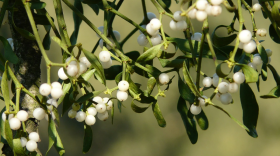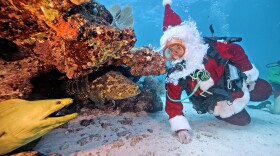Damage caused by Hurricane Ian to portions of the shoreline at Delnor-Wiggins Pass State Park is getting some attention via the planting of 500 mangroves.
Delnor-Wiggins is a popular destination with some of the most pristine stretches of beaches in Naples.
More than 25 volunteers from Duke Energy Florida, Coastal Conservation Association (CCA) Florida, as well as special help from Lee County Electric Cooperative (LCEC), teamed up Tuesday to lead the restoration by planting 500 red and black mangroves across a 4,400-square-foot portion of the park.
The mangroves were grown and donated by the Duke Energy Crystal River Mariculture Center, a company-owned-and-operated fish hatchery dedicated to environmental conservation, and CCA Florida. Additionally, Sunshine Ace Hardware, a local hardware store, donated shovels to aid in the restoration project.
Florida's mangrove ecosystems serve a vital role in the overall health of the state's coastal estuaries. Mangroves reduce coastal erosion caused by storm surges and improve water quality by absorbing excess nutrients like nitrogen and phosphorus. Mangrove soils and roots also sequester carbon dioxide while providing habitat and refuge to a wide variety of fish and wildlife.
While the park is outside of Duke Energy Florida’s service territory, this is not the first time the company has joined restoration efforts in southwest Florida.
Three days after Hurricane Ian exited the state, Duke Energy Florida wrapped up restoration of approximately 1 million customers and immediately deployed more than 500 Duke Energy workers and contractors from across the country to help restore power alongside LCEC in Cape Coral and Pine Island.
“As a company, our work doesn't end when the restoration ends,” said Melissa Seixas, Duke Energy Florida state president. “The relationships we made with LCEC and the entire community during this response were unforgettable. We are proud to be back in southwest Florida, helping to restore this important habitat with assistance from CCA Florida.”
As of May 2023, portions of Delnor-Wiggins reopened to the public for limited use and activities; however, some areas remain closed, including the location where the planting took place this afternoon.
More than 30 years ago, the Duke Energy Crystal River Mariculture Center started as an environmental compliance requirement to operate nearby power plants and has since grown into one of Florida’s most successful fish hatcheries and conservation allies.
Instead of shutting down the operation when the power plants closed and the environmental requirement was no longer necessary, Eric Latimer, Duke Energy Florida’s manager of the Mariculture Center, found ways to work with nonprofits, universities and state agencies, like CCA Florida, among others, to rebuild and maintain Florida’s fish populations and habitats that were being impacted by declining water quality and disasters such as red tide and hurricanes.
“The work that is being done today by Eric and the team at the Mariculture Center will have an incredible, lasting impact on Florida’s coastal estuaries,” said Brian Gorski, CCA Florida’s executive director. “Florida's fisheries would drastically decline without healthy mangrove populations and we thank Duke Energy for their unwavering commitment to the conservation of Florida's marine resources.”
To date, the Mariculture Center, with help from CCA Florida, has released nearly 5 million fish and crustaceans along Florida’s coasts and has donated approximately $200,000 worth of submerged aquatic vegetation for habitat restoration projects in lakes, springs and shorelines across the state.
Duke Energy Florida
Duke Energy Florida, a subsidiary of Duke Energy, owns 10,500 megawatts of energy capacity, supplying electricity to 1.9 million residential, commercial and industrial customers across a 13,000-square-mile service area in Florida.
About CCA Florida
The Coastal Conservation Association (CCA) was founded in 1977 after drastic commercial overfishing along the Texas coast decimated redfish and speckled trout populations. One of 19 state chapters, CCA Florida became the fifth state chapter in 1985. A 501(c)3 non-profit, the purpose of CCA is to advise and educate the public on conservation of marine resources. Through habitat restoration projects, water quality initiatives and fisheries advocacy, CCA Florida works with its over 18,000 members including recreational anglers and outdoor enthusiasts to conserve and enhance marine resources and coastal environments. Join the conversation on Facebook or learn more at ccaflorida.org.
WGCU is your trusted source for news and information in Southwest Florida. We are a nonprofit public service, and your support is more critical than ever. Keep public media strong and donate now. Thank you.WGCU is your trusted source for news and information in Southwest Florida. We are a nonprofit public service, and your support is more critical than ever. Keep public media strong and donate now. Thank you.












